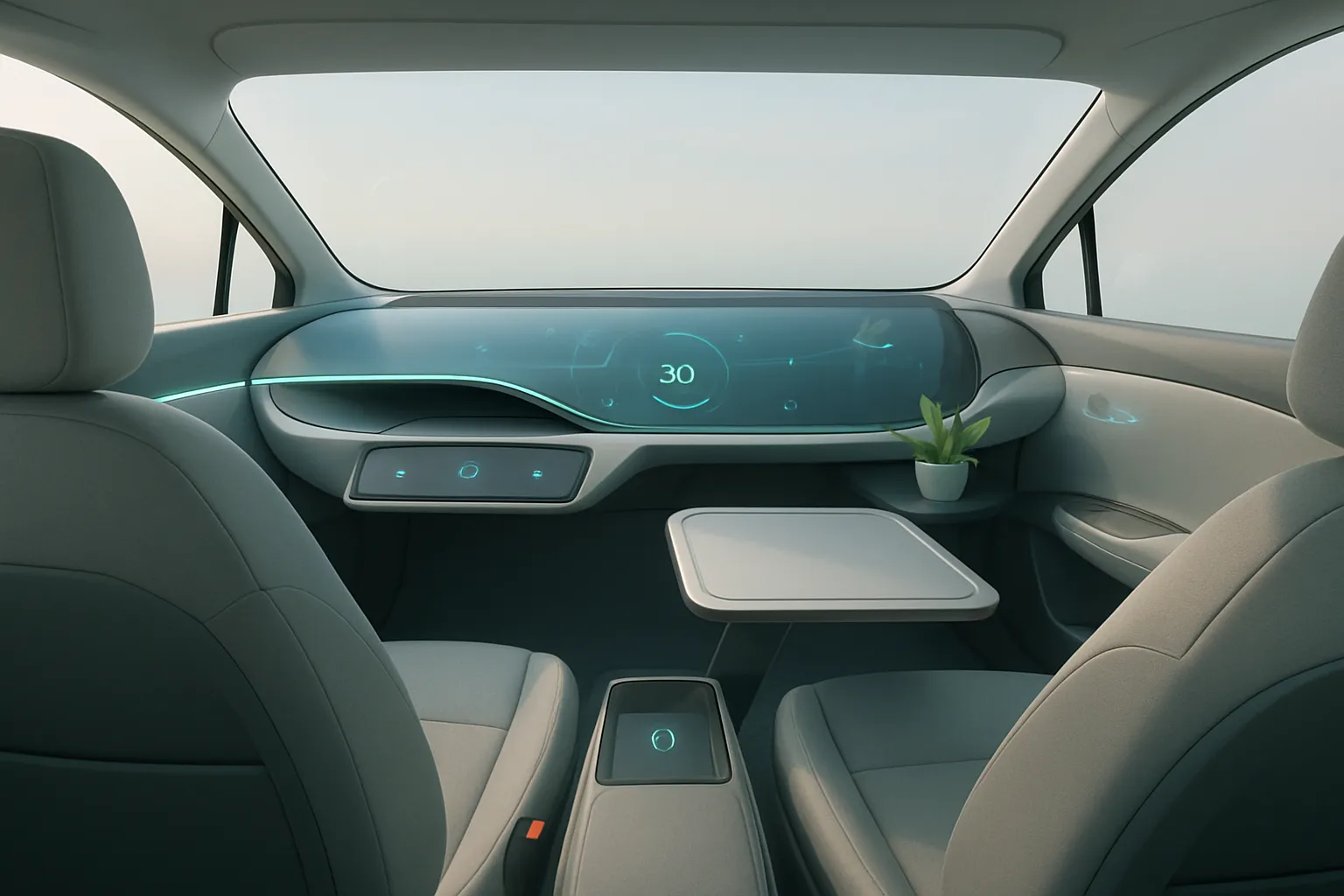Autonomous vehicles are poised to revolutionize our relationship with cars in ways we’re only beginning to understand. This article explores six key areas where self-driving technology will reshape how we interact with and perceive our vehicles. Drawing on insights from industry experts, we’ll examine how cars may transform from mere transportation tools into mobile productivity hubs, personalized commerce platforms, and social spaces.
- Cars Transform into Mobile Productivity Hubs
- Vehicles Evolve into Personalized Commerce Platforms
- Autonomous Cars Redefine Commute Experience
- Self-Driving Vehicles Disconnect Owners from Mechanics
- Cars Become Mobile Lounges and Errand-Runners
- Autonomous Vehicles Foster Face-to-Face Interactions
Cars Transform into Mobile Productivity Hubs
Cars won’t just drive us – they’ll fundamentally rewire our productivity.
I learned this lesson the hard way when I first started optimizing e-commerce sites for car dealerships. I was fixated on the traditional metrics like safety features and fuel efficiency, completely missing what actually moved the needle: how people planned to use their time differently.
For a recent automotive client, we surveyed more than 1,000 potential EV buyers about their ideal autonomous vehicle experience. The surprising insight? 78% cared more about the interior workspace configuration than the driving capabilities. This led us to completely redesign their product pages to showcase “productivity zones” rather than traditional car features.
Here’s the reality: Your car will become your mobile office, meditation space, and entertainment hub. Start thinking about your vehicle as a time multiplier, not just transportation. Design your current car’s interior today as if it were autonomous – it’ll prepare you for the inevitable shift.
Remember: The winners in the autonomous era won’t be those who adapt fastest to self-driving, but those who reimagine what a “car” means to daily life.
 Ajinkya Thete
Ajinkya Thete
CEO, CMO, NeonXpert Custom Signs
Vehicles Evolve into Personalized Commerce Platforms
As someone who advises global retailers and automotive brands on digital transformation, I see autonomous vehicles fundamentally shifting how people perceive and interact with their cars. The most significant change will be the transition from ownership and operation toward personalized mobility experiences. This shift is not theoretical – I have seen forward-thinking organizations already experimenting with new service models in this space.
Consider the in-car retail environment. Once vehicles drive themselves, time spent in transit is no longer about navigation or stress. Instead, it becomes a valuable, uninterrupted window for commerce, productivity, and entertainment. In my consulting work, I have helped brands reimagine the vehicle as a digital touchpoint, integrating commerce platforms directly into the dashboard and voice interfaces. For example, a commuter in an autonomous vehicle could order groceries, participate in a remote meeting, or engage with interactive product demos, all seamlessly integrated into the journey.
This evolution demands a new approach from both automakers and marketers. Brands will need to design for engagement within the vehicle, not just point-of-sale. The data generated by these user sessions will allow marketers to tailor offers and services based on location, trip purpose, and personal preferences – but this requires strict operational clarity on privacy and value exchange.
From a leadership perspective, the challenge is orchestrating partnerships across industries – automotive, technology, retail, and content providers. Through initiatives at ECDMA, I have seen how successful digital transformation in this area depends on breaking down silos and developing unified customer journeys.
In short, autonomous vehicles will recast cars as mobile platforms for experience and commerce, rather than mere transportation. For business leaders, now is the time to rethink product, service, and engagement strategies to capture this emerging value. The companies that adapt early and build trust will define the new standard of mobility-driven interaction.
 Eugene Mischenko
Eugene Mischenko
President, E-Commerce & Digital Marketing Association
Autonomous Cars Redefine Commute Experience
I’ve noticed that autonomous vehicles are shifting the car from a tool for transportation to a space for productivity and leisure. Last month, I tested a fully autonomous commute where I could focAutonomous vehicles will likely transform our interaction with cars from a hands-on driving experience to a more passive, service-oriented relationship. One specific example is the shift from car ownership to transportation-as-a-service, where vehicles become readily available through on-demand platforms, much like ride-sharing services but fully automated. This could lead to a future where personal vehicle ownership becomes less common, and our relationship with cars is more akin to using a public transportation system, albeit a highly personalized one.
us on work emails during a 45-minute drive instead of navigating traffic. It felt less like “driving” and more like having a mobile office. I imagine our relationship with vehicles evolving into one where the emphasis is on the experience inside the car rather than controlling it. Cars could become extensions of our living or working spaces, offering personalized entertainment, virtual meeting setups, or even quiet zones for reflection. This shift will make us rely less on skill and more on trust in technology, fundamentally changing how we perceive ownership, safety, and convenience in daily travel. It’s a subtle but profound shift in how humans and machines interact.
 Nikita Sherbina
Nikita Sherbina
Co-Founder & CEO, AIScreen
Self-Driving Vehicles Disconnect Owners from Mechanics
The biggest trend I foresee is the complete separation of people from understanding how their vehicles work. Today’s drivers commonly know basic vehicle maintenance – such as checking oil levels, jump-starting a car with a dead battery, and identifying unusual noises – but they lack knowledge beyond their expertise. However, with self-driving cars that handle everything and self-diagnose problems, nobody will have the opportunity to build intuition about the vehicle’s mechanics.
We are already witnessing this with newer cars and their multitude of electronic components. People often bring their cars to me without understanding what’s wrong – they simply state that something is broken according to the computer. They usually can’t explain any strange noises, poor performance, or problems leading up to catastrophic failure.
This disconnect is expected to worsen with the arrival of Level 5 autonomy. “It will simply say, ‘I need service,’ and drive itself to the nearest repair facility.” As a result, it will be difficult for owners to determine if the issue is a $50 sensor or a $5,000 computer module problem because they weren’t paying attention to how the vehicle was driving.
This has created a strange need-based dependence that has transformed people from operators of their vehicles to passengers who understand little about their cars. If they encounter problems in the future, they will feel utterly helpless, lacking any basic troubleshooting or mechanical knowledge.
From a salvage perspective, this might not be bad for business – people might have difficulty servicing their vehicles effectively or diagnosing the symptoms of a car breakdown. However, it’s disheartening to think that the car enthusiast could become a dying breed, as fewer people will know how to work on their own cars. Cars may one day be nothing more than appliances – we use them without understanding or caring how they work.
 MARC SKIRVIN
MARC SKIRVIN
President, Cash Auto Salvage
Cars Become Mobile Lounges and Errand-Runners
I’ve been following the developments in autonomous vehicle technology for a while, and it’s clear they’re going to change the game in how we think about travel. Instead of focusing on the road, you can spend your commute catching up on work, reading, or even getting a quick nap. It’s as if your car becomes less of a vehicle and more of a mobile lounge or office.
Imagine sending your car to pick up your children from school while you’re stuck at work, or having it run errands like going to the grocery store to pick up an online order. This shift not only frees up a lot of personal time but could also decrease our stress levels and change how we plan our days. We might even start caring less about car performance and more about comfort and connectivity features inside the cabin. Ultimately, as these autonomous vehicles become more common, our cars will turn into something we use rather than something we drive.
 Alex Cornici
Alex Cornici
Marketing & PR Coordinator, Flow Digital
Autonomous Vehicles Foster Face-to-Face Interactions
I envision that autonomous technology is set to transform cars into genuine social spaces. One of the most meaningful changes will be the return of face-to-face interaction. At present, drivers often miss conversations because their attention is fixed on the road. With automation, everyone inside the car will have the chance to engage equally without distraction.
A parent could read to a child, colleagues might use the time to hold a meeting, or friends could share a meal while traveling. The interior of the car may feel more like a lounge than a traditional vehicle. This change will allow travel time to strengthen relationships instead of isolating people. Journeys will no longer be defined only by reaching a destination. They will also become opportunities for deeper connection and shared experiences that enrich daily life.
 Ender Korkmaz
Ender Korkmaz
CEO, Heat&Cool







